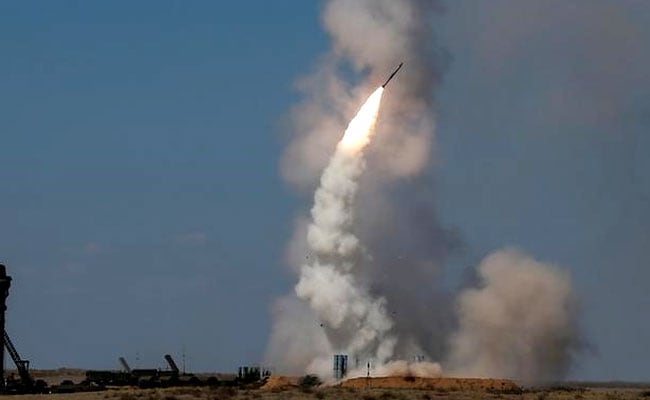
[ad_1]

One Ex-Russian diplomat warned that Putin felt Russia’s existence threatened, “he will press the button”.
Paris:
Banished from public consciousness for many years, the nightmare of nuclear warfare has surged again to prominence with Russia’s invasion of Ukraine, highlighting the erosion of the Cold War world safety structure.
With Moscow on the again foot in its offensive, the navy stalemate has raised fears Russia might resort to its nuclear arsenal to attain a breakthrough.
Russia, together with Britain, China, France and the United States, are the 5 recognised nuclear weapons powers and everlasting UN Security Council members.
“It’s the first time a nuclear power has used its status to wage a conventional war under the shadow cast by nuclear weapons,” mentioned Camille Grand, a former NATO deputy secretary-general.
“One might have imagined that rogue states would adopt such an attitude, but suddenly it’s one of the two major nuclear powers, a member of the UN Security Council,” he instructed AFP, insisting the precise use of the weapons stays “improbable”.
For now, the ethical and strategic nuclear “taboo” that emerged after the US bombings of Hiroshima and Nagasaki on the finish of World War II in 1945 nonetheless holds.
But rhetoric has escalated massively.
Russian TV broadcasts for the reason that invasion of Ukraine have repeatedly mentioned nuclear strikes on Western cities like Paris or New York.
One former Russian diplomat, asking to not be named, warned that if President Vladimir Putin felt Russia’s existence threatened, “he will press the button”.
The 12 months’s occasions have been a harsh wake-up name for Europe, which spent a long time in a state of relative ease by way of nuclear safety, having fun with the so-called Cold War “peace dividend”.
Across the Atlantic, US President Joe Biden warned in October of a possible “Armageddon” hanging over the world.
Disarmament ‘in ruins’
“The most spectacular event of the past half century is one that did not occur,” Nobel-winning economist and technique knowledgeable Thomas Schelling wrote in 2007.
But the framework that stored world leaders’ fingers off the button after 1945 had been crumbling for years earlier than Putin’s order to invade.
In 2002, the United States stop the crucial Anti-Ballistic Missile Treaty it had signed with the Soviet Union in 1972, which maintained the nuclear stability of energy.
Other essential agreements fell away within the years that adopted, together with the Intermediate-Range Nuclear Forces (INF) Treaty that Washington dropped in 2019, blaming Russia for not complying.
“Regarding disarmament, it’s all in ruins, apart from New Start,” Grand mentioned, referring to the Barack Obama-era settlement with Russia to cut back numbers of warheads, missiles, bombers and launchers.
‘Very harmful disaster’
India, North Korea and Pakistan, together with the 5 recognised powers, even have nuclear weapons, whereas Israel is extensively assumed to take action whereas having by no means formally acknowledged it.
North Korea sharply stepped up missile testing this 12 months, persevering with its pursuit of an impartial nuclear deterrent that started when it stop the Non-Proliferation Treaty (NPT) in 2003.
Washington, Seoul and Tokyo all consider a seventh nuclear weapons take a look at by Pyongyang is imminent.
The remoted dictatorship introduced in September a brand new nuclear doctrine, making clear that it might by no means hand over the weapons and that they might be used pre-emptively.
“We’re going to see a very dangerous crisis in Asia,” Chung Min Lee, a researcher on the Carnegie Endowment for International Peace, not too long ago instructed a Paris convention.
Non-nuclear international locations within the area worry that the safety offered by the US nuclear umbrella is fraying.
“If you imagine extended deterrence as a water balloon, today the water balloon has some critical holes and water is seeping out,” he added.
China’s nuclear arsenal can be rising, with Pentagon estimates placing it at 1,000 warheads — roughly on par with US bombs — inside a decade.
And within the Middle East, the wrestle to revive the 2015 nuclear take care of Iran, hobbled by its brutal repression of current protests at residence, has revived fears that Tehran might quickly be a “threshold state” on the point of constructing a bomb.
Proliferation fears
In August, a UN convention on the way forward for the NPT noticed a joint declaration by 191 international locations blocked on the final second by Russia.
One French diplomat reported “extraordinarily aggressive nuclear rhetoric” from Moscow and “disdain” for the treaty.
“We saw a break in Russia’s attitude, which had historically been in support of the NPT,” the diplomat added.
China was “very vocal”, providing a “very crude denunciation” of the US-UK-Australia AUKUS Pacific alliance that may ship nuclear-powered submarines to Canberra, the diplomat mentioned.
Beijing claimed that the alliance risked additional nuclear proliferation, whereas failing to “lift doubts about the opacity of its own nuclear doctrine or the speed at which its arsenal is growing”.
The invasion of a state that willingly gave up nuclear weapons, Ukraine, by its nuclear-armed neighbour has elevated fears of proliferation.
“Today, countries like Japan or South Korea might legitimately ask whether” they want a bomb of their very own, mentioned Jean-Louis Lozier, a former head of France’s nuclear forces.
“The same is true in the Middle East of Saudi Arabia, Turkey and Egypt,” he added.
(Except for the headline, this story has not been edited by NDTV employees and is revealed from a syndicated feed.)
Featured Video Of The Day
That’s Not How You Load A Gun. Video Of UP Cop’s Epic Fail Is Viral
[ad_2]